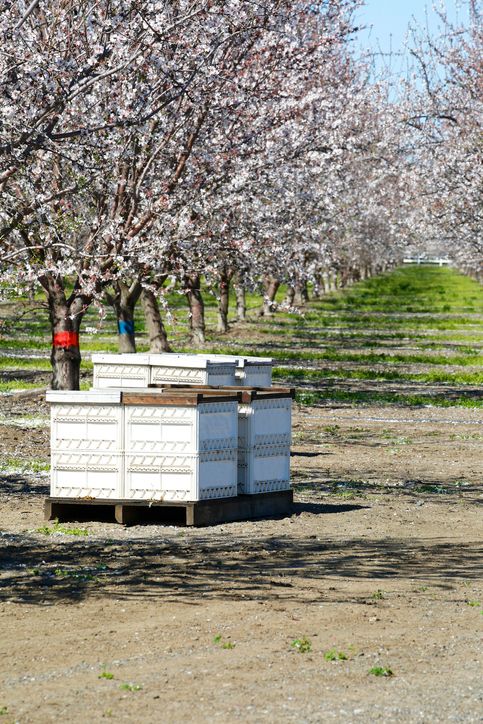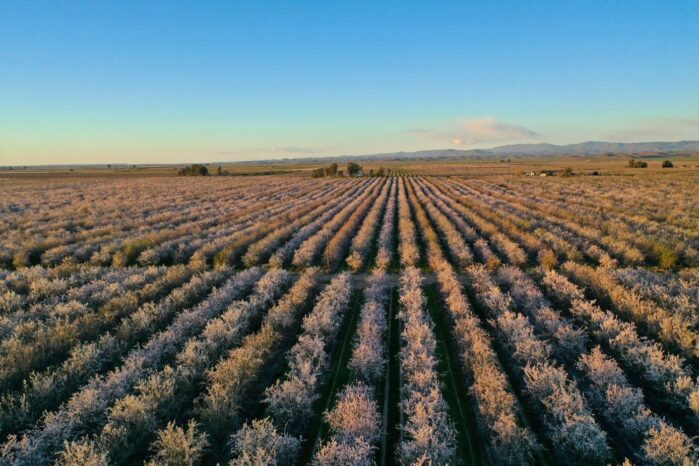While ‘regenerative’ is now the buzzword of choice in food marketing, we need more data to define what it means for individual crops before growers can see a clear business case for adopting new practices, says KIND Snacks.
“What regenerative means for almonds and row crops might be very different,” said Caitlin Birkholz, regenerative agriculture pillar lead at KIND.
“It might even be different within the same crop grown in different places. So Northern California is different to Southern California, and the yields can be radically different,” added Birkholz, who has just unveiled plans to test regenerative practices on 500 acres of almonds in California owned by KIND’s partner ofi (Olam Food Ingredients) via the KIND Almond Acres Initiative over the next three years.
“There can be benefits to a flexible definition of ‘regenerative agriculture’ when you’re trying to drive overall outcomes such as emissions reduction or water savings that is inclusive of all grower styles but delivers the same general outcomes.”
That said, KIND’s pilot aims to add to research already conducted by UC Davis and some almond growers in order to build a far more detailed picture of what regenerative ag practices make sense specifically for almonds, Birkholz told AFN.
The business case for regenerative farming
During the three-year pilot period, KIND aims to find the best combination of practices that can then be deployed by growers supplying 100% of the almonds sourced by KIND by 2030, she added.
So what might the business case revolve around for almond growers, beyond the fact that farming in a ‘regenerative’ fashion may in the future become a condition of doing business with big brands such as KIND (which was acquired by Mars in 2020)?

According to Birkholz, outcomes might include reduced water use, lower carbon emissions, soil health, bee health, and sequestered carbon, which may in turn save growers money.
Such benefits don’t necessarily come overnight, however, she acknowledged. “We’ve been thinking about the push and the pull of this conversation if we don’t have results from our pilot till year three. How do we create some pull mechanisms now?”
She added: “As regenerative agriculture can take 3+ years to show meaningful soil health changes, it can be hard to go to a grower and say, ‘Hey, can you adopt cover crops that you’re going to mow down in a couple of months for some unknown soil health benefit in the future?’ That can be a hard conversation to have.
“So that’s why we have a pilot that shows what that journey looks like, that will outline some of the challenges we encounter and how we overcame them. So if one grower says, ‘Hey, I tried this thing and it didn’t work for me,’ we can share these learnings and give growers more detailed, nuanced information. This helped me reduce pesticides, this helped me cut down on fertilizer costs.”
Financial incentives for growers
She added: “For the pilot, we’re co-investing with ofi because there are riskier components to it and new technologies we’re trying to explore. When we have some data in three years, then we can create a business case [to incentivize other growers to make these investments directly].
“One of the things we hope to show is that if you adopt these practices, it won’t negatively affect your yield or increase pests, and you’ll see additional benefits around soil health and tree health.”
Carbon markets
Asked about engaging in carbon markets, Birkholz said: “We will be taking yearly soil samples that measure the soil organic matter, as well as the soil organic carbon, so we’ll be able to know if the soil organic carbon increases, by how much, and where our baseline was.
“However, we’re still waiting to hear guidance on the best way to account for carbon sequestration in the supply chain, to understand if [measuring carbon] is more about science and learning or will growers be able to [monetize] that?”
Five key areas of focus
According to Birkholz: “There are growers in our supply chain who are already adopting some practices such as cover crops or compost, but they’re not doing all the practices. So that’s another thing we’re trying to test in our pilot: how can we combine practices to maximize beneficial outcomes?”
The KIND pilot will test five practices:
Cover crops: Testing a blend of five cover crops to build soil structure, increase soil carbon levels, create pollinator habitats, and help the land become more resilient in the face of a changing climate.
Subsurface irrigation: Drip irrigation system under the soil to ensure less water evaporates, a practice that can also reduce weeds.
Whole orchard recycling: Dedicating 38 acres to testing the impact of grinding trees into chips at the end of their lifespan and putting them back onto the orchard floor to serve as fertilizer and keep organic carbon in the orchard.
Compost and biochar: Testing if adding compost and biochar (a charcoal-like substance created from slow-burning almond shells) can store carbon, decrease the need for fertilizer and increase water retention.
Off-ground harvesting: Collecting almonds off trees instead of the ground to decrease soil disturbance and reduce the amount of dust in the air during harvest.
On-pack labeling?
While several food brands are now using terms such as “regeneratively farmed” on their packaging, KIND has no immediate plans to make claims on food labels, said Liz Jacobsen, global technical sustainability director at Mars.
“We have a lot of great content on our new website, where we also share more details about our partnership with UC Davis and our work with the California Water Action Collaborative (CWAC), to improve water security in California.
“But in terms of on-pack claims, we don’t have plans to put ‘made with regenerative ag’ on labels just yet, in part because there’s no clear definition yet. We also don’t know what that would mean legally in terms of substantiation.”





